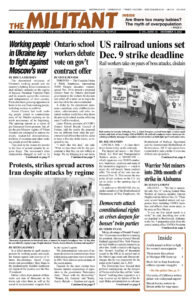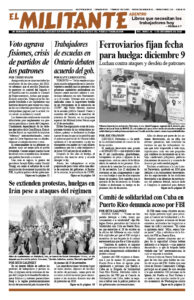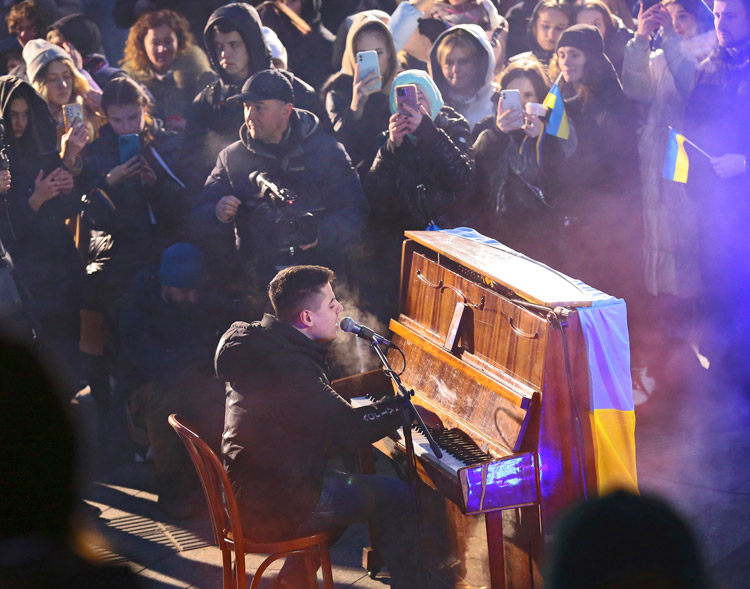The determined resistance of Ukraine’s working people and the country’s fighting forces continues to deal military setbacks to the regime of Russian President Vladimir Putin and his assaults against the existence and independence of their country. Putin also faces growing opposition at home to his war from working people, including workers in uniform.
Across Ukraine last week working people joined in commemorations of the Maidan uprising on the ninth anniversary of its beginning. The uprising started as a series of pro-European Union protests, but after the pro-Moscow regime of Viktor Yanukovych attempted to repress the mostly student-led demonstrations, millions of unionists and other working people joined the actions.
They took to the streets for months in the face of armed assaults by regime thugs. The movement’s class composition changed as well as its aims. It toppled Yanukovych. This working-class movement has marked the battle for Ukrainian sovereignty ever since.
“Our future is only possible if we remember the past,” said Tamara Shvets at a Nov. 21 memorial service in Kyiv. Her husband, Viktor, was killed by Yanukovych’s forces after he went to “protect the young people” in the Maidan in 2014.
Attacks on infrastructure
The Kremlin recently carried out some of its heaviest missile strikes against Ukraine’s infrastructure, crippling almost half of the country’s power grid. Millions have been left without electricity as the winter freeze approaches.
Forced out of Kherson, where they destroyed power and water facilities, Moscow’s troops are now shelling the city. The Ukrainian government urged civilians there to spend the winter elsewhere.
After compelling the Russian army to retreat from the sole regional capital it had captured, Ukrainian troops entered Kherson Nov. 11. They also launched an offensive to try to regain control of the strategic Kinburn Spit to the southwest of the city. Moscow’s occupation of that land cuts off Ukrainian access to the Black Sea port city of Mykolaiv.
Throughout Moscow’s eight-month occupation of Kherson an underground resistance by Ukrainians who stayed in the city disrupted Putin’s attempt to incorporate it into Russia and helped prepare for Kyiv’s forces to retake it.
They sabotaged rail lines and identified military targets for Ukrainian forces to bomb. Local residents hid arms caches for possible street fighting.
Setbacks reinforce isolation
Moscow faces greater international isolation as a result of its brutal invasion, the largest land war in Europe since 1945. Putin chose not to attend the Nov. 15-16 Group of 20 summit of the world’s main capitalist powers, held in Bali, Indonesia.
Host Indonesian President Joko Widodo said talks to reach a draft agreement between the rival powers at the meeting floundered over their conflicting responses to Moscow’s war. Washington and its imperialist allies are applying sanctions against Russia, which hit working people there hard and put obstacles in the way of forging solidarity between toilers in Ukraine and Russia. Other capitalist governments, from China and India to Saudi Arabia and South Africa, have kept links with Moscow.
Government officials at the meeting eventually signed a declaration, stating, “Most members strongly condemned the war in Ukraine,” and lamenting its impact on the world capitalist economy. Russian Foreign Minister Sergei Lavrov left before the communique was adopted. Both the Chinese and Indian governments took their distance from Putin, by adding their names to it.
Kyiv pressured by Biden, IMF
Biden is trying to hold in line U.S. allies among capitalist powers in Europe in the sanctioning of Russia, at the same time that his administration pressures the Ukrainian government to seek talks with the Kremlin and urges it to be ready to cede some of the territory seized by the invaders.
As Kyiv’s wartime debt has grown, the Ukrainian government is coming under pressure from the International Monetary Fund and World Bank to carry out privatization of state enterprises and more cuts to social spending. Already 40% of workers have lost their jobs, wages have been slashed and inflation is soaring. Bosses are taking advantage of the government’s wartime ban on strikes and its curbs on union rights to make further assaults on wages, safety and other conditions.
The Ukrainian parliament passed a law Nov. 4 to enable the confiscation of large amounts of property from the trade union movement, including its Trade Unions House in central Kyiv, which had been largely gutted in an arson attack by Yanukovych regime supporters during the Maidan rebellion.
Both Putin’s decision to draft 300,000 people into the army, largely workers and members of Russia’s oppressed nationalities, and Moscow’s retreat from Kherson have led to a further decline in support for his war.
“They are lying on television,” Irina Sokolova’s conscripted husband told her when he phoned from the front in Ukraine. “He had no idea how terrible it would be there,” she told the Washington Post, as commanders abandoned the draftees whose ranks were being decimated by shellfire.
Dozens of soldiers’ spouses and other relatives are making public statements condemning conditions faced by new conscripts.
Kyiv is trying to convince soldiers from Russia that they will be safe if they surrender. It has set up a hotline and a Telegram channel called “I want to live.” Since mid-September it has received more than 3,500 appeals for help, from draftees or their wives.


